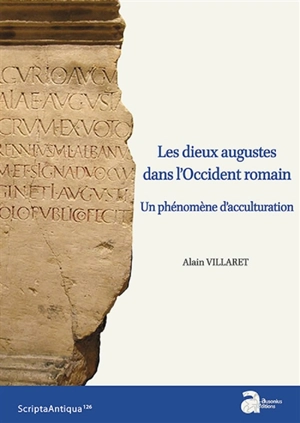
Les dieux augustes dans l'Occident romain : un phénomène d'acculturation
Alain Villaret
Versailles, Pontoise, Lyon 2ᵉ, Lyon 6ᵉ...
Ce que dit l'éditeurLe titre impérial donné en épithète aux « dieux augustes », ne les désigne pas comme incarnés dans l'empereur ou comme des sortes de lares protecteurs de la famille impériale mais exprime une association, une synergie entre les dieux et le prince. L'empereur est le médiateur des dieux auprès des hommes. Augustus, terme exclusif de cette association, renvoie au conditor Romulus, aux auspices, à l'auctoritas qui légitiment le pouvoir. Les dieux augustes se diffusent surtout en Occident d'Auguste au début du IVe s. Il s'agit moins de dieux politiques, que de divinités protectrices et bienfaitrices des cités et des particuliers. Les dieux romains et les divinités locales (indigènes ou interprétées) ont des parts comparables, ce qui souligne le respect des identités locales. Les élites municipales, surtout, leur consacrent nombre de dons évergétiques, se posant comme des relais du pouvoir et affirmant leur légitimité. Ils sont imités par les Augustales et les riches affranchis. Fonctionnaires, soldats, couches populaires sont en retrait Présents surtout dans l'espace urbain, les dieux augustes se concentrent dans les centres civiques où s'affiche le pouvoir. Scénographie et cérémonies expriment le consensus autour des empereurs, agents des dieux. Les dieux augustes témoignent de l'acculturation politique, religieuse, sociale des Provinciaux, qui manifestent ainsi leur volonté de s'intégrer à l'Empire. Augustan Gods, mainly known through epigraphy, commonly bestowed with the Imperial title Augustus/a as an epithet, are part of the « imperial cult » and represented a threefold political, religious and social acculturation. « Augustalization » does refer to the emperor but in that case he couldn't be considered as an incarnate god or even be seen as protected by the gods. It implied a synergy between the gods and the emperor who stood as their mediator, remaining close to men. The exclusive term Augustus/a refers to Romulus, to the auspices of the imperator, to auctoritas which made the Prince legitimate. Although quite rare in the East augustan gods were commonly well-spread in the West, from Augustus's reign until the early years of the IVth century. The Roman gods chosen for augustalization were not really the political divinities which might be expected to be found but more likely benevolent gods protecting the cities and their inhabitants. Under the gods carrying Roman names we can discover numerous native divinities which had been reinterpreted (interpretatio romana) and which, with the purely indigenous gods, keep their local roots. With a particular suppleness augustalization integrated into the Empire all these provincial identities. Characteristic of all the backgrounds influenced by romanization, augustalization was first and foremost used by the municipal elite, who, through their evergetism, spread it in the rural areas but mainly among the urban population, thus strenghtening their legitimacy. Augustales and rich freedmen, quick to imitate elite, spread it among the rest of the population. High-ranking officials and officers stayed in the background. Constantly present in all the urban areas augustan gods concentrated their presence in civic centres and other foci celeberrimi where the strenth of the political power was obviously seen. Urban scenographies and ceremonies reveal the consensus of all the members of a strong social hierarchy structured around the emperors seen as the direct go-betweens to the gods. Augustalization made the power even more sacred and legitimate and gathered around its symbolic representation an acculturated society with its manyfold identities. |
RésuméVersion remaniée d'une thèse, cette étude examine la diffusion des dieux augustes en Occident, divinités protectrices de cités et d'individus, particulièrement vénérées par les élites qui les considèrent comme des relais du pouvoir témoignant de leur légitimité. Scénographie et cérémonies montrent le consensus autour de l'empereur et manifestent la volonté des populations de s'intégrer à l'Empire. ©Electre 2024 |
Caractéristiques Auteur(s) Alain Villaret
(Auteur) Éditeur(s) Date de parution
31 octobre 2019
Collection(s)
Scripta antiqua
Rayon
Religions grecques et romaines
EAN
9782356133298
Nombre de pages
491
pages
Reliure
Broché
Dimensions
24.0
cm x
17.0
cm x
2.9
cm
Poids
928
g
|


